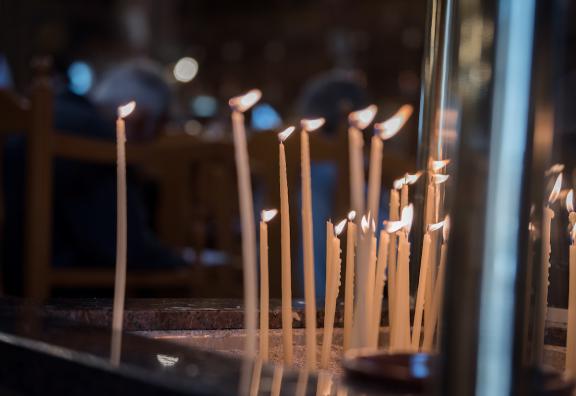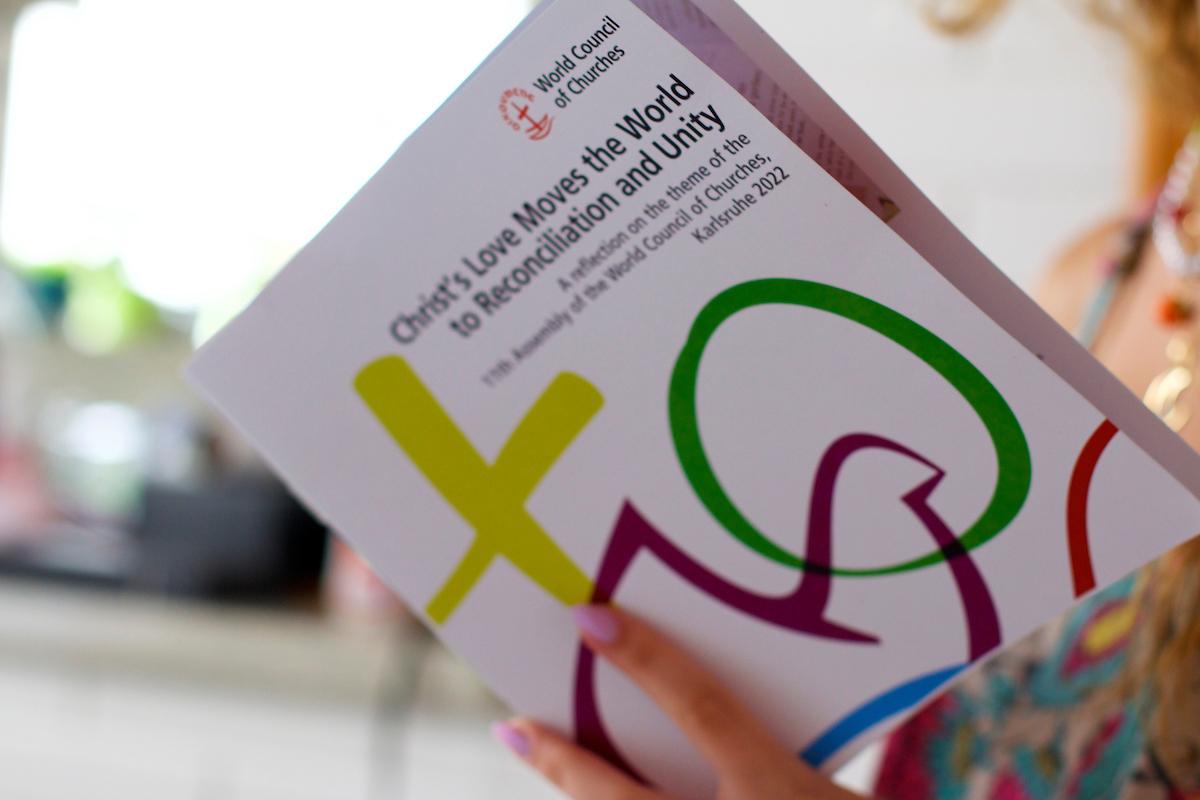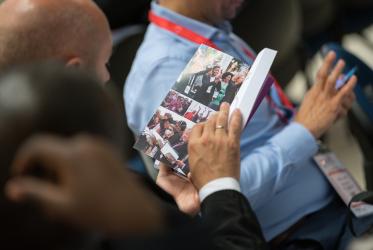In welcoming remarks, WCC moderator Dr Agnes Abuom shared highlights of recent Pilgrim Team Visits, giving examples of the sense of hope and solidarity the WCC offers to the world.
“As we move toward the assembly, we are perhaps in our last lap of our pilgrimage since Busan,” she said.
Abuom referred to the letter of James in which he talks about trials and temptations, and she reflected that, in such times, we should not be afraid. “It is through trials and temptations that we actually can get new energy, that we can be more strategic and renew,” she said. “The whole notion of endurance becomes key in times of trials and temptations.”
Abuom also noted the ongoing COVID-19 pandemic, and mentioned food insecurity as a major issue intertwined the climate emergency and the war in Ukraine. “When we talk about the Ukraine-Russia war we probably do not even imagine that countries in Africa are affected because they either cannot access wheat or because there is no more wheat available,” she said.
WCC acting general secretary Rev. Prof. Dr Ioan Sauca expressed gratitude for the leadership of the WCC central committee, WCC staff, and local host committee for the WCC 11th Assembly in Karlsruhe.
“I am deeply encouraged and inspired by such powerful dedication,” he said.
Sauca also offered a summary of the WCC response to the conflict in Ukraine. “From the beginning, the WCC has condemned the war, has called for an immediate end to armed hostilities, has appealed also for an immediate end to indiscriminate attacks with an escalating impact on civilians in Ukraine,” he said. “At every step, it has been my prayer that the WCC can provide a space for dialogue; for listening and caring for one another; and for just peace and reconciliation. We are and should continue to be alternative to geo-political solutions that seek to deepen divisions.”
The executive committee completed its meeting under a cloud of great sadness when it was announced that Metropolitan Gennadios of Sassima, vice moderator of the WCC central committee, passed away in the late afternoon of 1 June.

Programme and financial reports
The executive committee reviewed the follow-up to previous decisions. It approved 2021 narrative programme reports, monitored ongoing programme work and reviewed a draft pre-assembly programme evaluation.
The governing body received the report of the audit committee, adopted the 2021 financial report and monitored the impact of the pandemic and the war in Ukraine on WCC finances.
The executive committee further received member church delegations, and nominated additional delegates to strengthen the profile of the assembly, noting that 760 delegates are expected in Karlsruhe. The executive committee also finalized the agenda of the central committee meeting 15-18 June. The agenda will includecontinuing the process of the election of a new general secretary, revising the WCC constitution and rules, receiving a revised draft unity statement for the assembly, and proposing public statements on issues of concern.
The executive committee will meet on 14 June before the central committee.
Public statements
The WCC executive committee expressed global concerns via four public statements.
Sudan
The first statement is on the WCC’s ecumenical solidarity visit to Sudan, a visit planned for early 2020 in light of the political upheavals and transitions of 2019, but postponed to earlier in 2022 due to the COVID-19 pandemic.
“The purpose of the ecumenical solidarity visit was to accompany the churches and people of Sudan in the midst of significant changes and challenges in the country, and carried a strong message to the interim leadership of the Sudan Council of Churches of the support and solidarity of their ecumenical partners in the region and around the world,” the statement reads. “The executive committee affirms this initiative, expresses its support for the churches of Sudan in their witness and ministry, and encourages national ecumenical cooperation in addressing the needs of Sudan’s people at this pivotal point in the history of their nation.”
The statement also encourages the All Africa Conference of Churches, Fellowship of Christian Councils and Churches in the Great Lakes and the Horn of Africa “and indeed all ecumenical partners and specialized ministries with the means to do so to offer their support and accompaniment to the churches and people of Sudan and to the Sudan Council of Churches during this period of re-building and re-engagement.”
UK-Rwanda Migration and Economic Development Partnership
The second WCC executive committee statement, on the UK-Rwanda Migration and Economic Development Partnership, refers to the partnership through which asylum-seekers who are already on UK soil can be transferred to Rwanda, where their asylum claims will be processed.
“Though UK government officials claim that the agreement ‘fully complies with all national and international law, including the UN Refugee Convention and European Convention on Human Rights,’ many reputable human rights organizations as well as senior church leaders in the UK have criticized it,” reads the WCC statement. “While the Partnership claims that it will only target those that arrived in the UK ‘illegally, through safe countries,’ critics describe it as an attempt by a wealthy country to outsource migration management to a poorer country in violation of obligations under international refugee law.”
The statement concludes: “The executive committee calls upon the government of the United Kingdom to reconsider this policy, in light of the additional threat it poses to people already fleeing from conflict and oppression,” the statement reads.
Food insecurity and the conflict in Ukraine
A third statement reiterates grave concern over the global humanitarian impacts of the war in Ukraine. “The conflict in Ukraine continues to cause a terrible toll of death, destruction, displacement and misery for the Ukrainian people, with thousands of civilians reported to have been killed, and more than 14 million people – well over a quarter of the entire population – forced to flee from their homes,” reads the statement. “In addition, the impacts of this war are being felt far beyond the borders of Ukraine or the European region, producing a downward spiral effect on a global economy already battered by COVID-19 and the climate crisis.”
The statement continues: “Prices of food, fertilizer and energy have risen rapidly in many parts of the world, given the important roles played by Russia and Ukraine in these markets.”
Kidnappings in Nigeria
A fourth statement expresses relief at hearing the news of the safe release of kidnapped religious leaders in Nigeria—but also expressed alarm over an escalating crisis of criminal kidnappings across the nation.
“It is estimated that in the first three months of this year alone, more than 3,500 people have been killed and many more kidnapped by armed groups in Nigeria,” the statement reads. “In a particularly serious attack on a passenger train travelling between Abuja and Kaduna in March, at least nine people were killed, and more than 60 are believed to be still held by the gunmen.”
The statement names clergy who have been victims of kidnappings. “The WCC has received reports of many other clergy and Christians who have been kidnapped and still remain in captivity, with little or no effort by the government to rescue the victims,” reads the statement.
WCC condemns kidnappings in Nigeria, urges adequate security for all (2 June 2022)
WCC urges action on global humanitarian impacts of the war in Ukraine (2 June 2022)
WCC urges reconsideration of UK-Rwanda Migration and Economic Development Partnership (2 June 2022)
WCC executive committee urges “support and accompaniment to the churches and people of Sudan” (2 June 2022)
WCC deeply mourns loss of leader Metropolitan Gennadios of Sassima (2 June 2022)
As WCC executive committee convenes, the global fellowship provides space “for listening and caring for one another” (31 May 2022)






